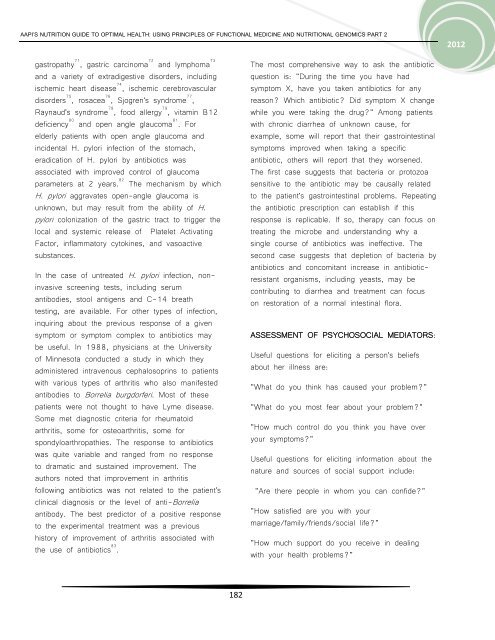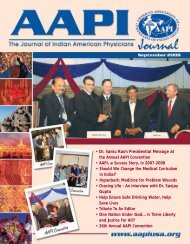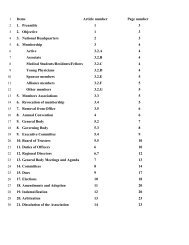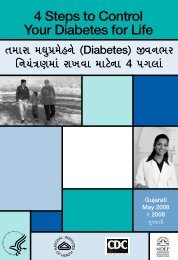optimal health: functional medicine and nutritional genomics
optimal health: functional medicine and nutritional genomics
optimal health: functional medicine and nutritional genomics
You also want an ePaper? Increase the reach of your titles
YUMPU automatically turns print PDFs into web optimized ePapers that Google loves.
AAPI’S NUTRITION GUIDE TO OPTIMAL HEALTH: USING PRINCIPLES OF FUNCTIONAL MEDICINE AND NUTRITIONAL GENOMICS PART 2<br />
2012<br />
gastropathy 71 , gastric carcinoma 72 <strong>and</strong> lymphoma 73<br />
<strong>and</strong> a variety of extradigestive disorders, including<br />
ischemic heart disease 74 , ischemic cerebrovascular<br />
disorders 75 , rosacea 76 , Sjogren's syndrome 77 ,<br />
Raynaud's syndrome 78 , food allergy 79 , vitamin B12<br />
deficiency 80<br />
<strong>and</strong> open angle glaucoma 81 . For<br />
elderly patients with open angle glaucoma <strong>and</strong><br />
incidental H. pylori infection of the stomach,<br />
eradication of H. pylori by antibiotics was<br />
associated with improved control of glaucoma<br />
parameters at 2 years. 82<br />
The mechanism by which<br />
H. pylori aggravates open-angle glaucoma is<br />
unknown, but may result from the ability of H.<br />
pylori colonization of the gastric tract to trigger the<br />
local <strong>and</strong> systemic release of Platelet Activating<br />
Factor, inflammatory cytokines, <strong>and</strong> vasoactive<br />
substances.<br />
In the case of untreated H. pylori infection, noninvasive<br />
screening tests, including serum<br />
antibodies, stool antigens <strong>and</strong> C-14 breath<br />
testing, are available. For other types of infection,<br />
inquiring about the previous response of a given<br />
symptom or symptom complex to antibiotics may<br />
be useful. In 1988, physicians at the University<br />
of Minnesota conducted a study in which they<br />
administered intravenous cephalosoprins to patients<br />
with various types of arthritis who also manifested<br />
antibodies to Borrelia burgdorferi. Most of these<br />
patients were not thought to have Lyme disease.<br />
Some met diagnostic criteria for rheumatoid<br />
arthritis, some for osteoarthritis, some for<br />
spondyloarthropathies. The response to antibiotics<br />
was quite variable <strong>and</strong> ranged from no response<br />
to dramatic <strong>and</strong> sustained improvement. The<br />
authors noted that improvement in arthritis<br />
following antibiotics was not related to the patient's<br />
clinical diagnosis or the level of anti-Borrelia<br />
antibody. The best predictor of a positive response<br />
to the experimental treatment was a previous<br />
history of improvement of arthritis associated with<br />
the use of antibiotics 83 .<br />
The most comprehensive way to ask the antibiotic<br />
question is: "During the time you have had<br />
symptom X, have you taken antibiotics for any<br />
reason? Which antibiotic? Did symptom X change<br />
while you were taking the drug?" Among patients<br />
with chronic diarrhea of unknown cause, for<br />
example, some will report that their gastrointestinal<br />
symptoms improved when taking a specific<br />
antibiotic, others will report that they worsened.<br />
The first case suggests that bacteria or protozoa<br />
sensitive to the antibiotic may be causally related<br />
to the patient's gastrointestinal problems. Repeating<br />
the antibiotic prescription can establish if this<br />
response is replicable. If so, therapy can focus on<br />
treating the microbe <strong>and</strong> underst<strong>and</strong>ing why a<br />
single course of antibiotics was ineffective. The<br />
second case suggests that depletion of bacteria by<br />
antibiotics <strong>and</strong> concomitant increase in antibioticresistant<br />
organisms, including yeasts, may be<br />
contributing to diarrhea <strong>and</strong> treatment can focus<br />
on restoration of a normal intestinal flora.<br />
ASSESSMENT OF PSYCHOSOCIAL MEDIATORS:<br />
Useful questions for eliciting a person's beliefs<br />
about her illness are:<br />
"What do you think has caused your problem?"<br />
"What do you most fear about your problem?"<br />
"How much control do you think you have over<br />
your symptoms?"<br />
Useful questions for eliciting information about the<br />
nature <strong>and</strong> sources of social support include:<br />
"Are there people in whom you can confide?"<br />
"How satisfied are you with your<br />
marriage/family/friends/social life?"<br />
"How much support do you receive in dealing<br />
with your <strong>health</strong> problems?"<br />
182
















